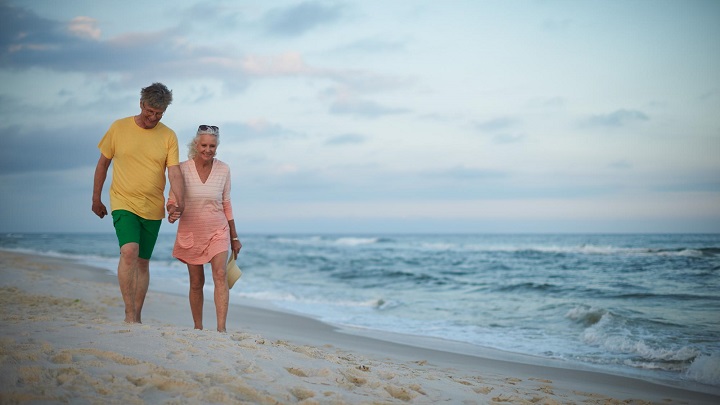Whether they call themselves snowbirds or winterbirds, Canadians who travel south are changing their migration pattern dramatically this winter.
In a normal year, more than one million Canadians head south to the U.S., Mexico and other destinations to follow the sun.
The COVID-19 pandemic is clipping their wings and forcing many to stay in Canada this winter. Of those who are travelling, some are driving west to RV parks on Vancouver Island.
Canadians staying at home include Monika and Wayne Hilson.
For about 12 years, the West End couple have spent January, February and March near sunny Puerto Vallarta, Mexico.
But not this year. Instead of travelling and spending three months in Playa Gemelas, they’re staying close to home in Vancouver.
“I’m really not one of these scaredy-cat types,” said Monika Hilson, 76. “Initially, I thought about going down.”
She figured she could go out and buy groceries while her husband Wayne, who is 84 and has prostate cancer, stayed in their condo with its big deck. But her husband’s health along with other COVID-19 related concerns tipped the balance toward taking a pass this year.
She said a webcam at the Puerto Vallarta pier where they often go for lunch shows waiters without masks.
“You know, if people are not adhering to any social distancing, what’s the point?” said Hilson, a former flight attendant who worked through the swine flu and SARS without catching either virus.
Hilson said beaches in the resort are closing at 3 p.m. and restaurants at 8 p.m.
“What fun is that?” she said.
Plus there’s the worry of whether someone sitting beside you on the plane has COVID-19, not to mention the masses of people that congregate at the airport.
“I’ll bet my last dollar that most Americans are going to go anyway,” Hilson said. “They don’t seem to recognize the fact there’s a virus, or don’t care about it or ignore it due to the fact of their fearless leader.”
She’s resigned to spending more time looking at squirrels in Stanley Park and feeding roasted pumpkin seeds to finches by Lost Lagoon.
“You know what?” she said. “Yesterday was supposed to be a crappy day. I saw the sunshine and I thought, ‘Hey, how lucky we are to live on English Bay. You live beside a 1,000-acre park.’
“Hello! Am I bored? I’m not.’”
The B.C. Lodging and Campground Association has said that snowbirds who can’t drive to the U.S. are driving to RV parks on Vancouver Island. The association has reported that RV parks that operate at half capacity during winter have waiting lists.
Evan Rachkovsky, director of research and communications for the Canadian Snowbird Association, said in a non-COVID-19 year, more than one million Canadians leave the country and head south to the sun. Snowbirds are individuals 55 years of age and older who spend 31 days or longer outside of the country each winter.
“We’ve spoken with some members who are adamant that they do want to travel down south this season,” he said.
“Others, and I’d say a majority, aren’t comfortable travelling in the midst of a global pandemic. They have chosen to stay home this winter season.”

Of his association’s 110,000 members, about 70 per cent drive south in their own vehicles. But Rachkovsky said with the land border likely to remain closed well into 2021, it’s difficult to say how many Canadians will decide to fly to the U.S.
A survey of 3,000 snowbirds by Snowbird Advisor found that 44 per cent are not going anywhere this winter, 31 per cent said they were, and 25 per cent are undecided.
The survey released Wednesday reported that 50 per cent are going to Florida, 20 per cent to Arizona, eight per cent to California and six per cent to Mexico. A total of five per cent said they were coming to B.C. which is much higher than previous years when it is less than one per cent.
Rachkovsky advises anyone who decides to head south to read their out-of-province health insurance coverage carefully.
CSA endorses Medipac travel insurance plan which is covering COVID-19, he said.
“Some insurance providers are capping or putting limits on the amount of money they’re providing for COVID-related claims,” Rachkovsky said.
The federal government has a global travel advisory in effect which says Canadians should “avoid non-essential travel outside of Canada until further notice.” With a federal travel advisory in effect, insurance may not cover travel or health expenses.
Vancouverite Camilla Grinti said she already has her ticket to Puerto Vallarta for Jan. 7. Grinti, who calls herself a winterbird, doesn’t plan to buy health insurance. She plans to stay in Mexico until the end of April.
She knows she’s taking a risk.
Grinti has a friend who got sick with something not related to the pandemic in Mexico. Grinti’s friend said she received excellent care in a private clinic.
“I am in a lucky position,” said Grinti, 73. “If by any chance I get sick, I have money enough to pay for private clinic in Mexico. I don’t count on Canada to give me back the money.”
Source: https://www.thewhig.com/
